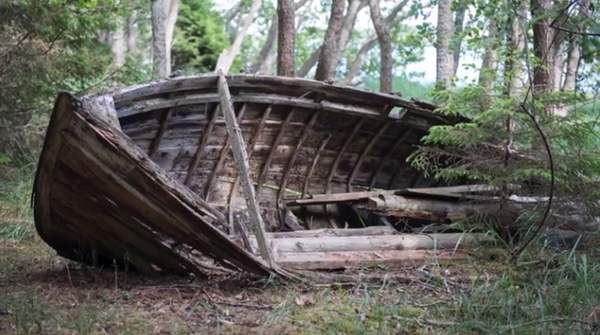
Photo: screenshot from documentary "Baltic Refugee Boats"
Those of us born abroad yet raised to be Estonian are both blessed and challenged. Blessed, thanks to our heritage, as it is not always the case of being awarded the knowledge of a beautiful language, unique culture. And challenged by the need to know about the inglorious and often cruel past. As those of us with fathers who had to serve in occupying totalitarian-led armies, conscripted contrary to the Geneva Convention, mothers who had to flee their homeland, knowing what the invaders would bring again, exile and summary death perhaps never knew. For some of our parents chose not to talk about those years. Of fear. Of terror. Of risking everything, just to be free. At the cost of losing all that ever was safe and wonderful.
Those wonderful parents, nurturing necessarily what it means to be an Estonian, while shielding their children from the horrors of unbridled brutal warfare are often no longer with us. And many rue the lost opportunity that only advancing age years of not asking the questions that could then be answered. Or perhaps not. For many, even those still among us with healthy memories did not and do not wish to discuss the cruelties that their eyes had seen, ears had heard.
Advertisement / Reklaam
Advertisement / Reklaam
It helps in this case to have access to documentary material. Providing living proof of what those no longer with us had to brave to make it from oppression to freedom. Both were introduced to a household thanks to an interest in roots, searching for the fate of relatives during that time. Sweden was the first choice of destination of those fleeing the advancing Soviet mad horde. But September of 1944 was not a good month for braving capricious Baltic Sea waters. Unknown numbers perished in the attempt to make it to safe haven. Thousands arrived, surmounting incredible odds in small fishing boats.
The first documentary was filmed in July of last year on the Swedish islands of Gotland and Fårö. Dozens of Baltic refugee boats are still on their shores as a reminder of the arrival of the refugees. Toomas Eichenbaum wrote in Estonian Life, issue #42, October 21 at length of the work of Swedish archaeologist Dr Mirja Arnshav. The fascinating short film includes interviews with people who remember the events of almost 80 years ago. It was featured on Estonian State Television (ETV/ERR) in Estonian. Subtitled, one need not have to switch between hearing Estonian and English. It can be watched at this link.
The other stunning, this time full-length documentary is Dottern bakom järnridån (The Daughter behind the Iron Curtain). The tale of fleeing the Soviets, a family split up. A one-year-old girl left with her grandmother in Germany, mother and father escaping to Sweden, with hopes of being united once again. It was not to happen, the baby and her grandmother were forcibly returned to Soviet-occupied Estonia.
That child’s two sons, with different fathers, made this moving documentary, available below.
Advertisement / Reklaam
Advertisement / Reklaam
Both documentaries rely on footage that cannot but fail to move the watcher. Educating while not moralizing. The story of Mare Milk, as captured by her sons ends with a blunt look at what Russia has done in Ukraine. The stories are remarkably similar. Most important, underlining that the Yalta Conference with the Big Three of Churchill, FDR and Stalin effectively sold out the peoples of Eastern Europe.
The Iron Curtain rusted through, as well it had to. Estonia is once again a member of the family of free peoples. But as always noted emphatically in the West on Remembrance Day. Lest we forget. Do find the time to view these compelling stories, and educate your children, grandchildren. Easy to do in this day and age, if only one knows where to click. And save for future distribution.
TÕNU NAELAPEA
























